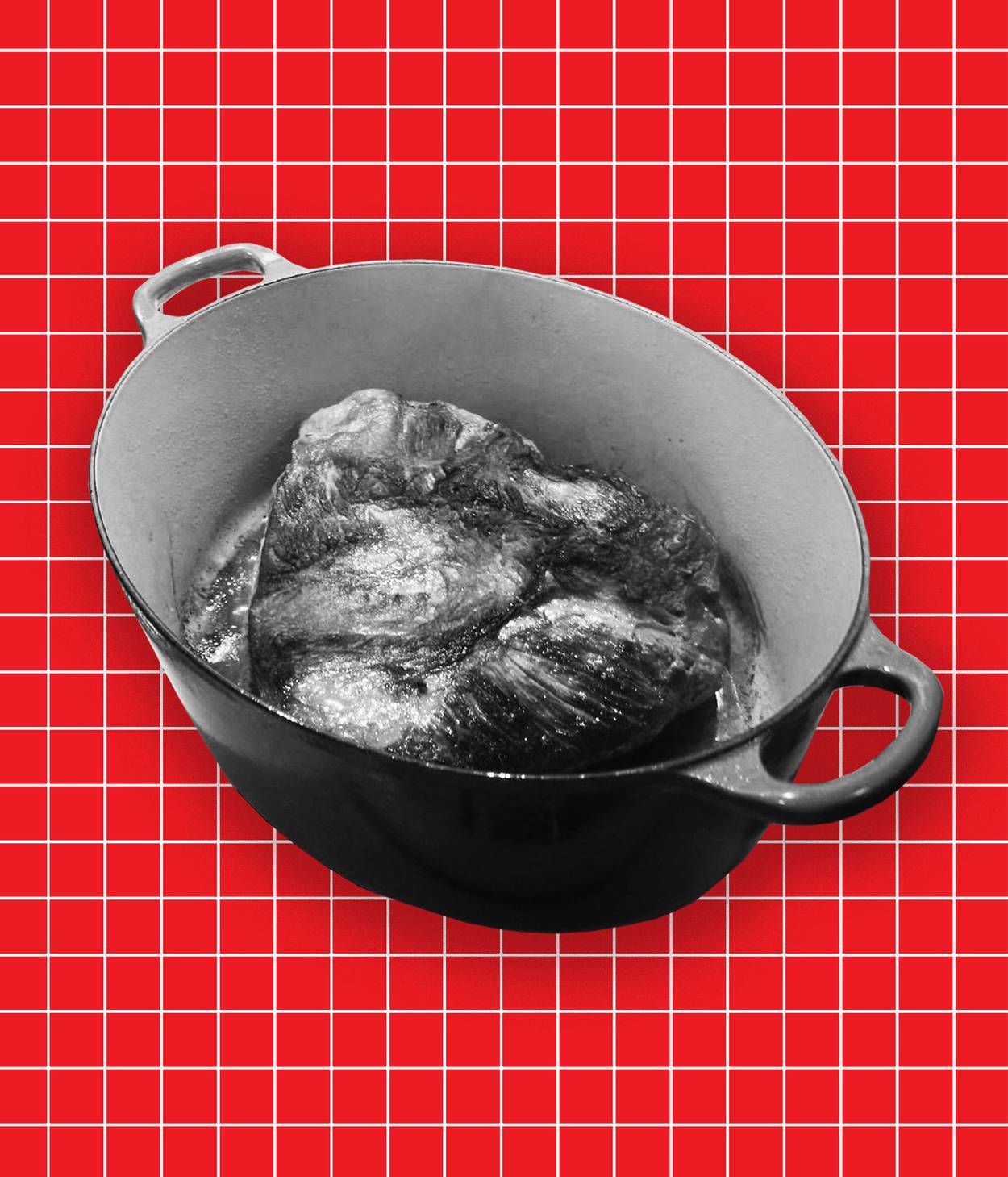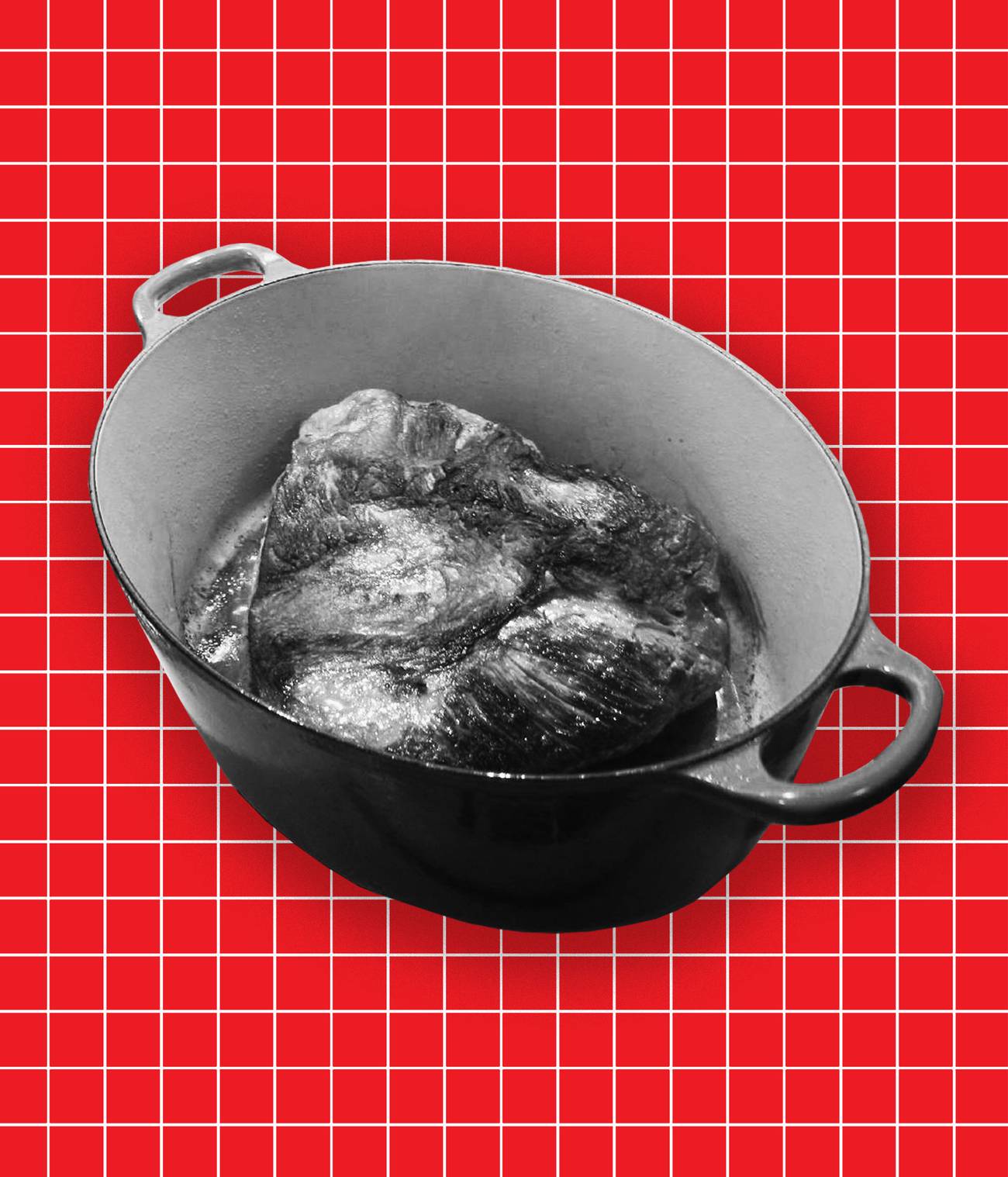The Joy of Bad Brisket
It’s not all about how it tastes. It’s also about how it makes you feel.




When I was growing up, my dad was a meat-and-potatoes kind of guy. Whenever my mom would suggest we mix it up for a holiday with chicken or turkey, he would complain and insist that there had to be beef, too. My mom didn’t love to cook but she had a kosher delicatessen on speed dial. On Rosh Hashanah, she would always order brisket and it would be the star of the dinner table. My relatives would exclaim, “Did you try the brisket? It’s delicious—so tender and juicy.”
Personally, I didn’t understand the fuss. It was aesthetically unappealing with its orange-brown coloring, and its “tender bite” felt mushy to me. Still, their oohs and aahs made me want to keep giving it a chance, hoping to find the magic in this meat. But after a few bites, I’d push it to the side of my plate in favor of eating more soup, challah, and apple cake.
When I got married and started my own family, there were aspects of my childhood I wanted to emulate and other parts I wanted to do differently. Holiday meals were special growing up and I hoped to continue that tradition. But my vision was to become a mom who cooked, not catered. The type who had a vast culinary dowry to pass down to my children, with tons of home-cooked dishes that my kids clamored for year after year.
As with most aspirations, I was only partially successful. I managed to create many memorable meals but there had also been times I resorted to takeout. Brisket continued to be an Achilles’ heel in my repertoire of recipes. Sometimes it was bland, other times it was burned. Even when it came out totally “right,” it was never memorable enough for the kids to ask me to make it again. In the last few years, I had given up trying, making roast chicken or marinated flank steak for the holidays instead.
Last year renewed my appreciation for cooking and for eating meals, especially holiday meals, together with family. I was fortunate to spend the year in a pod with my husband and my two younger children; my oldest daughter, Allie, had moved in with her boyfriend, Jack, in Boston.
Even though I complained about how much cooking I was doing in 2020 during the pandemic, I was looking forward to cooking for the High Holidays. By September, the COVID-19 numbers were down, and even though we couldn’t get together with extended family, Allie and Jack were going to join us in New Jersey. This was going to be Jack’s first Rosh Hashanah with us; in fact, it was his first Rosh Hashanah, period. Raised Catholic, he understood how important religion and Jewish culture are to Allie. She was excited to introduce him to our traditions. I wanted to make sure I pulled out all the stops, including conquering my culinary nemesis.
A week before Rosh Hashanah, I turned to my husband and said, “I think I will try making brisket this year.”
I felt giddy as I prepped throughout the week for the holiday, getting anything I could done in advance. The morning before Rosh Hashanah, my husband and I had to go to Long Island. My dad, 81, was being released from the hospital and I wanted to get him settled at home with my mom. Since we couldn’t celebrate the holiday together, I was happy to come see them for a short visit before heading back to my house to cook the evening meal.
My plans went awry soon after our arrival at my parents’ place. I had envisioned Allie and Jack walking into my house that afternoon, dropping their bags and exclaiming, “Everything smells so good!” Instead, I wasn’t there to greet them when they arrived. Allie texted, “Where are you?”
“Dealing with Grandpa,” I texted back. “Home soon.”
The clock seemed to be ticking in overdrive and panic began to set in. My husband and I didn’t feel we could leave my parents’ house; they were out of sorts and needed assistance. I wanted to be a good daughter, but I also wanted to take care of my kids and be a good mother. Desperately, I called several restaurants in my neighborhood, but at this late time, no one could cater a holiday meal for six people.
What was I going to do? Was I going to have to usher in the New Year serving challah, apple slices with honey, and two large pizzas?
By 4 p.m. I was in tears on the phone with Allie explaining that I hoped to leave soon. “Don’t worry,” she said, “Jack and I will get started on the meal, and you can help us when you get home.”
Her offer made me feel both awful and grateful.
We didn’t get home that evening until after 8 p.m. By then the sun had set and my excitement had faded. I had done everything I could for my parents but felt I had let down my kids in the process. My daughter had entrusted me to make a holiday dinner that would make Jack feel welcome, accepted, and excited to learn more about Judaism. Instead he had taken the day off from work, driven five hours, and was told to make his own dinner. It wasn’t the first impression of our home, culture, and family values that I had hoped to make. I felt depleted and defeated; 2020 had stolen something else.
My husband and I walked in the door and were immediately taken aback. The holiday I had envisioned had manifested. The aromas, the table setting, the welcome feeling—it was all real. The only difference was that I was the one asking, “What smells so good?”
Allie and Jack had prepared everything as I had outlined, preparing all the items on the menu I had meticulously typed. She took charge of the side dishes and Jack tackled the brisket. He followed the first page of a recipe I had printed off Epicurious perfectly. Then he realized that the second page was missing. He attempted to text me several times, but I was so preoccupied with my dad, I hadn’t seen the messages. When Jack finally located the rest of the instructions online, he learned that the brisket needed to cook for five hours, minimum.
So when dinner was served, the brisket smelled amazing, but it was not quite cooked. In fact, it was hard as a rock. Just as I had as a child, I took a few bites but then filled up on challah, soup, and apple cake. I know Jack felt sad that his valiant attempt hadn’t resulted in a great tasting brisket. But it was the attempt itself that made this brisket the best one I had ever had. It nourished me in a way I needed after the day and year I had experienced. Finally, this orange-brown (not tender) meat had shown me its magic.
This year, brisket is once again on our High Holiday menu. Not because I changed my mind about the taste of brisket or because I need redemption after last year’s debacle. I’m serving brisket because it is a tradition. It reminds me of family—the one I grew up with, the one I raised, and the one I hope the future holds. It turns out that you don’t need to like how brisket tastes to love how it makes you feel.
Randi Mazzella is a freelance writer and journalist specializing in parenting, mental health, wellness, and pop-culture.